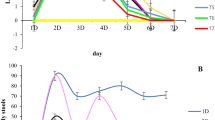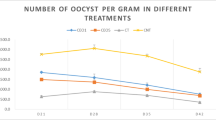Abstract
The comparative anticoccidial effects of herbal products with a standard synthetic anticoccidial drug on the production performance, intestinal histology, and some blood biochemical parameters in broilers exposed to experimental coccidiosis was investigated. One-day-old broiler chicks (n = 336) were randomly distributed into six groups. One group served as a control, the second was treated with the coccidial infection, the third was treated with synthetic anticoccidial drug (Elancoban), the fourth group was treated with an herbal product (Cozante), the fifth group of birds was treated with Norponin, and the sixth group was treated with Emanox. The results indicated that BWG, BW, FCR, and PEF decreased significantly (P < 0.05) in the positive control. Body weight gain, BW, and PEF were significantly (P < 0.01) high in Elancoban-treated birds. On day 25, lesion score was significantly (P < 0.01) low in duodenum, jejunum, and ceca in Elancoban-treated birds control. On day 30, lesion score was significantly (P < 0.05) low in Emanox-treated birds as compared with the positive control. Albumin concentration was significantly (P < 0.01) low in Emanox while glucose concentration was significantly (P < 0.01) high in all the treated groups compared with the positive control birds. The total antioxidant capacity was significantly (P < 0.05) high in Emanox on day 15 and 30 as compared with the positive control. The results showed that birds exposed to the natural anticoccidial products showed improved villi and total antioxidant capacity. We concluded that herbal products performed better than the positive control group.


Similar content being viewed by others
References
Abudabos AM, Alyemni AH, Dafallah YM Khan RU (2016) The effect of phytogenic feed additives to substitute in-feed antibiotics on growth traits and blood biochemical parameters in broiler chicks challenged with Salmonella typhimurium. Environ Sci Pollut Res 23: 24151–24157
Abudabos AM, Alyemni AH, Dafalla YM, Khan RU (2017a) Effect of organic acid blend and Bacillus subtilis alone or in combination on growth traits, blood biochemical and antioxidant status in broiler exposed to Salmonella typhimurium challenge during the starter phase. J Appl Anim Res 45:538–542
Abudabos AM, Alyemni AH, Swilam EO, Al-Ghadi M (2017b) Comparative anticoccidial effect of some natural products against Eimeria spp. infection on performance traits, intestinal lesion and occyte number in broiler. Pak J Zool 49:1989–1995
Abudabos AM, Alyemni AH, Dafalla YM, Khan RU (2018) The effect of phytogenics on growth traits, blood biochemical and intestinal histology in broiler chickens exposed to Clostridium perfringens challenge. J Appl Anim Res 46:691–695
Alhidary IA, Rehman Z, Khan RU, Tahir M (2017) Anti-aflatoxin activities of milk thistle (Silybum marianum) in broiler. World’s Poultry Sci J 73:559–566
Ali M, Chand N, Khan RU, Naz S, Gul S (2019) Anticoccidial effect of garlic (Allium sativum) and ginger (Zingiber officinale) against experimentally induced coccidiosis in broiler chickens. J Appl Anim Res 47:79–84
Chand N, Faheem H, Khan RU, Qureshi MS, Alhidary IA, Abudabos AM (2016) Anticoccidial effect of mananoligosacharide against experimentally induced coccidiosis in broiler. Environ Sci Poll Res 23:14414–14421
Chand N, Shamsullah R, Khan RU, Mobashar M, Naz S, Rowghani I, Khan MA (2019) Mannanoligosaccharide (MOS) in broiler ration during the starter phase: 1. growth performance and intestinal histomorpholgy. Pak J Zool 51:173–176
Khan RU, Naz S, Nikousefat Z, Selvaggi M, Laudadio V, Tufarelli V (2012a) Potential applications of ginger (Zingiber officinale) in poultry diet. World’s Poultry Sci J 68(2):245–252
Khan RU, Naz S, Nikousefat Z, Tufarelli V, Laudadio V (2012b) Thymus vlugaris: alternative to antibiotics in poultry feed. World’s Poultry Sci J 68:401–408
Raza T, Chand N, Khan RU, Shahid MS, Abudabos AM (2016) Improving the fatty acid profile in egg yolk through the use of hempseed (Cannabis sativa), ginger (Zingiber officinale), and turmeric (Curcuma longa) in the diet of Hy-Line White Leghorns. Arch Anim Breed 68:183–190
SAS (2003) SAS System for Windows. Release 9.1.3. SAS Institute Inc., Cary, NC, USA
Tanweer AJ, Saddique U, Bailey CA, Khan RU (2014) Antiparasitic effect of wild rue (Peganum harmala L.) against experimentally induced coccidiosis in broiler chicks. Parasitol Res 113:2951–2960
Tehseen M, Tahir M, Khan RU, Jabbar A, Ahmad B, Ahsan T, Khan MS, Khan S, Abudabos AM (2016) Additive effect of Nigella sativa and Zingiber officinale herbal mixture on performance and cholesterol profile in broiler. Philip Agri Sci 99(4):408–413
Funding
The authors extend their appreciation to the Deanship of Scientific Research at King Saud University for funding this work through the research project no. NFG-7-18-03-03.
Author information
Authors and Affiliations
Corresponding author
Ethics declarations
This experiment was approved by the Departmental board of Studies on Ethics, Methodology and Welfare, King Saud University, Kingdom of Saudi Arabia.
Conflict of interest
The authors declare that they have no conflict of interest.
Additional information
Responsible editor: Philippe Garrigues
Publisher’s note
Springer Nature remains neutral with regard to jurisdictional claims in published maps and institutional affiliations.
Rights and permissions
About this article
Cite this article
Alhotan, R.A., Abudabos, A. Anticoccidial and antioxidant effects of plants derived polyphenol in broilers exposed to induced coccidiosis. Environ Sci Pollut Res 26, 14194–14199 (2019). https://doi.org/10.1007/s11356-019-04615-2
Received:
Accepted:
Published:
Issue Date:
DOI: https://doi.org/10.1007/s11356-019-04615-2




